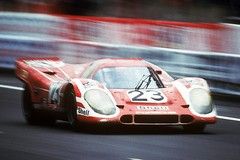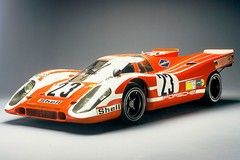Porsche: 40 Years Of Wins At Le Mans Classic
Stuttgart marks 40 years since its first Le Mans win by sending a phalanx of historic Porsches to Le Mans Classic
With 'proper' Le Mans over for another year, fans of endurance racing turn their attention to the biennial nostalgia-fest that is the Le Mans Classic - now less than a month away.
On the weekend of 10-11 July, more than 400 cars that raced at the famous circuit de La Sarthe between 1923 and 1979 will head back to Le Mans, and this year Porsche is celebrating 40 years of victories there.
Audi might have nailed a 1-2-3 finish at Le Mans this weekend, courtesy of some very fast Peugeots blowing up their V12 diesel engines, but Porsche still reigns supreme as the most successful marque au Mans.
Even though the four rings have swept the podium four times and claimed 10 overall victories since 2000, Audi still has some way to go before it matches Porsche's 16 overall victories.
To celebrate its Le Mans history, some of Porsche's winning cars will lead an anniversary parade, as well as taking part in the race. Hans Herrmann and Richard Attwood, the pair that brought Porsche its very first victory, will also be on hand for several autograph sessions.
Porsche has also very kindly recounted the tale of that 1970 victory in a press release, along with a summary of its other victories. Now, we wouldn't ordinarily recommend a press release as a riveting read, but this is the exception to the rule. So settle back with a cup of tea and a biscuit and enjoy...
Press Release
On 14 June 1970, Porsche claimed the first of what would become 16 overall victories in the world's most prestigious endurance race, the Le Mans 24 Hours.
After precisely 4,607.811 kilometres - or 343 laps - Hans Herrmann (Germany) and Richard Attwood (Great Britain) were first across the finishing line in the legendary Porsche 917 KH from Porsche Salzburg. Gerard Larrousse and Willy Kauhsen in the Martini Porsche 917 LH, followed by Rudi Lins and Helmut Marko in the Porsche 908/02, took second and third places respectively, making it a total triumph for Porsche on the podium.
However, the road to this victory was by no means an easy one for Porsche. The Stuttgart sports car manufacturer had been racing at the French circuit since 1951, achieving numerous class wins thanks to intrinsic Porsche qualities such as lightweight construction, aerodynamics and reliability. In 1969, Porsche was pipped to the post in the closest ever Le Mans race, with Herrmann and Larrousse in the Porsche 908 finishing just 75 metres - around one second - behind the Ford GT 40 of Jacky Ickx.
In the anniversary year of 1970, all the signs pointed towards an offensive that would finally see the much longed-for overall victory in Le Mans go to Porsche. The 917 was destined for victory, having made its debut just a year earlier. On 21 April 1969, the 25 Porsche 917s were approved by the motor racing homologation commission. The cost of materials alone exceeded DM5 million. The Porsche 917, developed by Ferdinand Piëch, was unveiled at the Geneva Motor Show. This new 'ultimate' Porsche quickly caused a stir among rival competitors. Weighing in at close to the minimum weight of 800 kg, it went on to become one of the fastest and most successful racing cars of all time. The lightweight 12-cylinder engine delivered up to 580 hp at 8,400 rpm from a displacement of 4.5 litres. This enabled the long-tail version to reach speeds approaching 400 km/h (248 mph) on the 5.8km Hunaudières straight at Le Mans.
In the run-up to the 1970 race, it was clear that the lessons learned from previous years had been worthwhile. Realising that rash manoeuvres in the first few hours of this classic endurance race would ultimately end in failure, Porsche made the experienced Hans Herrmann its first choice as driver. Herrmann, who lived close by Stuttgart in Sindelfingen, combined speed and good sense. Together with Englishman Richard Attwood, he started in the 4.5-litre short-tail version bearing the number 23, which was painted in the red and white colours of Porsche Salzburg. The team's second car, featuring a 4.9-litre engine and long-tail body, was driven by fellow Briton Vic Elford and Kurt Ahrens (Germany). A further three Porsche 917s were entered by the British team owner John Wyer, along with the distinctive psychedelic-coloured 4.5-litre long-tail version of the Martini team. There was also an entire armada of 907, 908, 910, 911 S and 914/6 models. At precisely 4 p.m. on 13 June, 24 Porsche cars stood at the starting line in Le Mans. By the next day there were still 12 remaining, five of which were classified as finishers. The only other cars to be classified were two Ferrari 512s - this was out of a total field of 51 starters.
This race went down in history - and not just from the perspective of Porsche - because of the disastrous weather. Vic Elford recalled how it was sometimes impossible to overtake, even on the long straights. Kurt Ahrens described it as being like sitting in a boat. And just a few weeks after his victory, Hans Herrmann admitted that driving in the rain had prompted him to make the decision to finally hang up his helmet no matter what the outcome. When leaving his house in Sindelfingen-Maichingen, his wife had asked him when he was going to give up driving, to which he responded: "When I win."
A promise is a promise. An hour after the start, which saw the drivers begin the race sitting in their cars instead of performing the world-famous "Le Mans start", Herrmann was only in ninth place. The race leader was Jo Siffert, also in a Porsche 917, followed by Jacky Ickx in a Ferrari 512 S. Siffert later missed a shift and blew his engine, while Ickx crashed his red racer at the chicane. At around 6:15 p.m. came the almost unbelievable news that four Ferrari 512 S had crashed into one another in the driving rain and were out of the race. The race also took its toll on the Porsche armada, with all three 917s of the Gulf team gradually dropping out.
Now was the moment for the experienced veteran Herrmann, who had the perfect partner in Richard Attwood, to show what he could do. Under the most difficult weather conditions, he gradually moved his way up the field, guiding the Porsche Salzburg 917 confidently to the first ever overall victory for Porsche at Le Mans. He realised the significance of this moment as the race came to an end on 14 June 1970: "Wow! That may have been your last lap ever as a racing driver."
Back home in Stuttgart, his victory was celebrated with a parade, in which he drove his winning car through the city to the market square. Thousands of people turned out to congratulate Hans Herrmann, ex-racing driver!
Porsche followed up this success with a further 15 overall victories at Le Mans, the second coming just a year later in 1971. In a unique Porsche 917 with a lightweight magnesium chassis, Gijs van Lennep and Dr. Helmut Marko drove to victory on a still largely chicane-free circuit. In doing so, they set an incredible record, which has never been broken. The Porsche 917 completed precisely 5,335.313 kilometres and 397 laps in 24 hours, clocking up an average speed of 222.304 km/h (138.140 mph) despite all of the pit stops and the long night. The fastest lap in the race was achieved by Jackie Oliver's Gulf-liviered 917, with an unbelievable 244 km/h (151.6 mph) average speed, while the 917 long-tail Coupé of Elford/Larrousse was clocked at a maximum speed of 386 km/h (239.8 mph) along Hunaudières in 1971.
In 1976 and 1977 the Porsche 936 was victorious, while in 1981 it won again driven by Jacky Ickx and Derek Bell with a new turbo engine. Belgian driver Ickx won at Le Mans six times, four of them in a Porsche. In 1982 he was yet again part of the winning team in a triple victory that represented the first milestone for the most successful racing car of all time, the Porsche 956. Up to 1994, different variants of the 956/962 won at Le Mans seven times. 148 of these were produced by the Porsche Motorsport Department in Weissach.
In some years, Porsche conceded the most important race of the year to customer teams, who emerged as frequent winners. Klaus Ludwig and the Whittington brothers thus achieved victory in Le Mans in 1979 with a Porsche 935 for the Cologne-based Kremer team, while Reinhold Joest guided the Porsche brand to well-deserved overall victories in 1984, 1985 and 1997.
Faced with the strongest ever field to line up at Le Mans in June 1998, Porsche racing director Herbert Ampferer spoke at the time of the "race of the century". Porsche was represented with two new 911 GT1 race cars and achieved a stunning double victory for the factory in the world's most important endurance race, in front of a crowd of 250,000 thrilled spectators. This was the 16th and most recent overall victory for Porsche at the Sarthe circuit.
http://www.carsession.com/car-news/audi-r15-tdi-wi...
'The victorious Audi R15 TDI with Timo Bernhard (Germany), Romain Dumas (France) and Mike Rockenfeller (Germany) completed a total of 397 laps in the 24 hours. With the covered distance of 5,410 kilometers, the triobroke the 1971 record set by Dr. Helmut Marko and Gijs van Lennep in the Porsche 917 that was considered unbeatable because the Hunaudières straight at that time had no chicanes – another demonstration of the performance capabilities of Audi TDI technology.'
Gassing Station | General Motorsport | Top of Page | What's New | My Stuff






